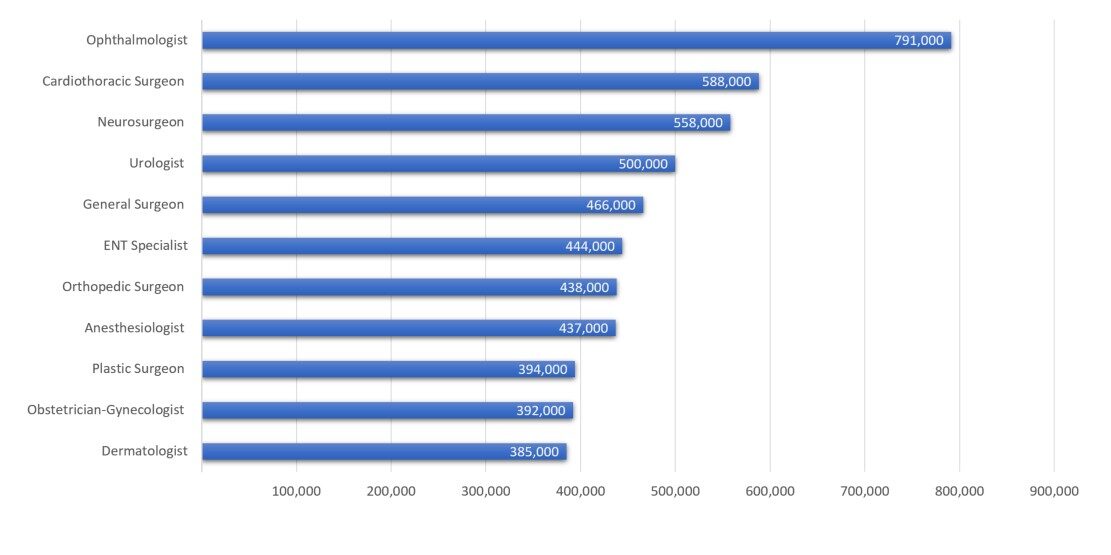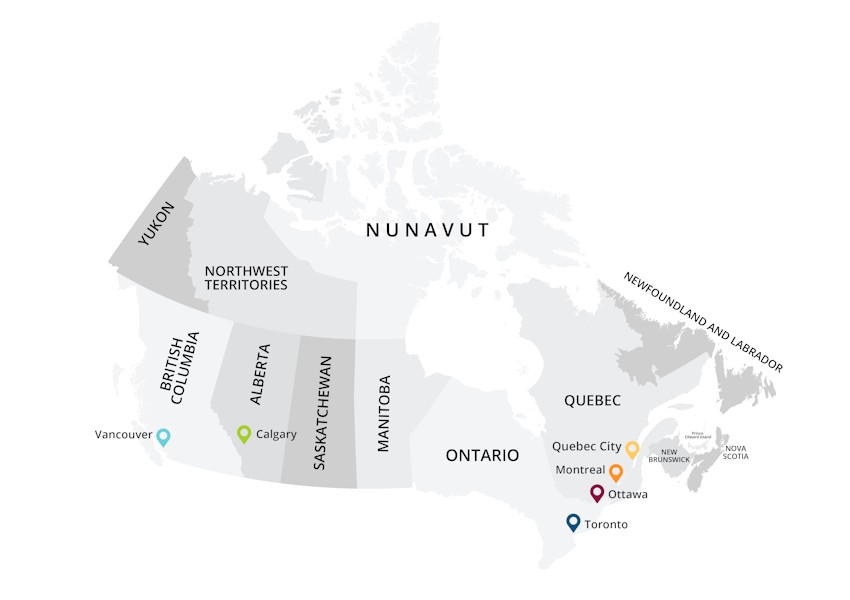Healthcare Jobs in Canada After MCCQE1

- Understanding MCCQE1 and Its Importance
- How Does MCCQE1 Impact Your Medical Career?
- Overview of Healthcare Jobs in Canada
- What Healthcare Jobs in Canada Are in Demand?
- Opportunities for IMG
- How do I prepare for MCCQE Part 1?
- How Can Ace QBank Help You Secure a Healthcare Job in Canada?
- Key Takeaways
Pursuing healthcare jobs within the vibrant and diverse landscape of Canada represents a journey of immense potential and profound impact. Achieving success in the Medical Council of Canada Qualifying Examination (MCCQE) Part 1 marks a moment in this path.
Successfully navigating through Canada’s medical qualification examinations is not just about obtaining a license to practice. It opens up an array of prospects with the renowned Canadian healthcare system, widely acclaimed for its commitment to quality care, accessibility, and prioritizing patient needs.
In this post, we strive to illuminate the indispensable value of MCCQE1 and its role in securing residency positions. Furthermore, we aim to steer you through numerous pathways available subsequent to triumphantly clearing MCCQE1. We highlight how your expertise, acquired knowledge and passion can discover fitting expression within Canada’s prestigious health sector – whether in the dynamic environment of urban hospitals or the tranquillity of rural clinics.
Join us as we delve into exploring prospects arising from engagement with healthcare jobs in Canada following completion of MCCQE1 – equipping you with vital insights so necessary for propelling your commendable career forward.
Understanding MCCQE1 and its Importance
The MCCQE1 represents a pivotal step toward receiving your medical license in Canada. However, it is not the only examination you’ll face on this path. Another key test to prepare for, although less rigorous, is the National Assessment Collaboration (NAC).
At the heart of these assessments – overseen by the reputable Medical Council of Canada (MCC) – lies an exhaustive exploration into your understanding and application of medical knowledge as well as decision-making abilities in clinical scenarios.
Notably, succeeding in these examinations isn’t just academically significant; their importance extends to real-world implications too. They stand as mandatory prerequisites that pave the way toward securing employment opportunities within Canadian healthcare jobs.
These exams are truly reflective of a candidate’s grasp on fundamental medical concepts and their practical applicability in patient care – skills indispensable for any healthcare jobs in Canada.
What is the MCCQE1 Exam Format?
With the MCCQE1 being a computerized evaluation consisting of 210 diverse multiple-choice questions and 38 clinical decision-making cases, this examination effectively demonstrates your proficiency across various medical disciplines such as internal medicine, surgery, pediatrics, obstetrics and gynecology, psychiatry and even extends to population health and ethics.
Designed based on objectives laid by the Medical Council of Canada, this test is an in-depth exploration evaluating each candidate’s medical knowledge alongside their aptitude for precise clinical decision-making. It precisely analyzes abilities pertaining to the application of medical knowledge in diagnosing and managing treatment procedures across numerous real-world scenarios.
The MCCQE1 carries profound importance for those seeking possibilities for practicing medicine outside their home countries with special emphasis on licensure within Canada – it holds prominent value in securing roles within the healthcare industry globally. More pointedly saying—it clearly indicates your problem-solving capabilities along with critical thinking skills ahead of entering any residency program based out there.
So, think beyond just passing—see it as an integral aspect towards attaining that coveted doctorate position anywhere in Canada. Triumphing over this exam with impressive results is essentially a seal verifying you are ready—with ample know-how about practicing medicine competently while safeguarding patients’ well-being first always.
Thus underlining why preparing thoroughly toward cracking the MCCQE1 isn’t just necessary but pivotal to embark on a prosperous journey into getting licensed!

How Does MCCQE1 Impact Your Medical Career?
The MCCQE Part 1 deeply matters in guiding the development path of medical professionals within Canada. It signifies an important turning point, as it verifies a candidate’s suitability to embark on the next phase of training – their residency. Passing this exam is a non-negotiable requirement for anyone wishing to apply through the Canadian Resident Matching Service (CaRMS), which connects newly graduated doctors with appropriate residency programs across our nation. This step holds substantial importance for those who dream of focusing their efforts on a particular branch of medicine and carving out a successful career amidst Canada’s robust healthcare system.
Moreover, obtaining success in your MCCQE Part I—coupled with other criteria like clearing the NAC examination—is instrumental in achieving the Licentiate from The Medical Council of Canada (LMCC). Possession of LMCC often forms part and parcel among prerequisites to secure a full-fledged medical license conferred by provincial and territorial medical regulatory boards. Undeniably, this marks an extraordinarily proud milestone in any physician’s journey toward professional growth proving their readiness to practice independently.
MCCQE1 Impact on Medical Careers | |
Eligibility for Residency | Obtaining a satisfactory result in the MCCQE Part I signifies that the candidate has reached the national benchmark which is deemed suitable for a medical graduate commencing postgraduate training. |
Licensure | The MCCQE Part I along with the NAC exam completion is required for the LMCC. The LMCC is often a requirement for medical licensure by provincial and territorial medical regulatory authorities. |
Career Progression | Success in the exam can influence the opportunities available to a medical professional in terms of specialty choice and residency program selection, which in turn impacts future career paths. |
International Recognition | While primarily for practice in Canada, the LMCC and medical licensure. In other words, MCC qualifications can sometimes be recognized internationally, providing potential opportunities abroad. |
It’s important to recognize the profound effect this exam has on a candidate’s career path. Far from just a test, its results may shape your choice of specialization and how well you compete in the CaRMS process. Residency programs often keep an eye out for MCCQE1 scores when gauging candidates, meaning that performing admirably could significantly boost your chances of securing your top-choice residency program.
On the other hand, passing this examination is not only about proving one’s academic prowess – it demonstrates dedication towards upholding high standards of medical practice as expected by healthcare institutions. It solidifies your place within the esteemed circle that makes up our medical community.
Scoring high on this exam speaks volumes about what you’re bringing to the table — proof that you hold not just relevant medical knowledge but also requisite clinical skills typical of a fresh medical graduate in Canada. This is especially meaningful for International Medical Graduates (IMG). Regardless if they’re seeking opportunities via ready-practice programs scattered across various provinces or looking to pursue prestigious fellowships and job openings down the line—they show they’ve got what it takes.

Overview of Healthcare Jobs in Canada
The healthcare system, in Canada is crucial to the country’s infrastructure providing services to its citizens. It encompasses a variety of professions each contributing uniquely to the well being and success of Canadians. One key profession in demand is that of doctors. Including both practitioners and specialists especially in rural areas where access to medical care limited.
The essential role of nursing, in our healthcare system is truly remarkable. Registered Nurses (RNs) Licensed Practical Nurses (LPNs) and Nurse Practitioners (NPs) all play roles as members of care teams in various settings, such, as hospitals and community health centers contributing greatly to improving patient care quality.
The journeys their hearts and hands navigate in providing quality patient care help form the backbone of our healthcare setting.
Additionally the need for laboratory technicians remains constant due to their role, in diagnostics and research activities that support effective healthcare services.
Personal support workers (PSWs) are another part of the healthcare sector providing valuable assistance to a diverse range of individuals. Including the elderly, disabled persons, and those requiring chronic care management. Comprehensively, oral healthcare contributes critically as well with dental hygienists and dental assistants playing pivotal roles in proffering preventive care services.
Different qualifications, extending from diplomas and certificates to advanced degrees are mandated for these roles based on specific job requirements. Furthermore, the majority of healthcare professionals must secure licenses from pertinent provincial regulatory institutions in order to practice professionally within Canada.
Healthcare professions across the country propose an array of working environments such as hospitals, clinics, community health centres along with private practices and long-term care establishments. Numerous positions necessitate adaptive schedules or rotational shifts that cater to the continuous nature of healthcare provision.
Present prospects for jobs within the Canadian healthcare industry echo positivity which are primarily fueled by an evolving demographic structure revealing older populations along with rising demand for comprehensive health services.

What Healthcare Jobs in Canada Are in Demand?
The question of healthcare jobs in Canada is always intriguing to IMGs. What healthcare jobs in Canada are in demand? Are these healthcare jobs in demand competitive? How can I secure a career in healthcare jobs in Canada? well, let’s provide insight into these healthcare jobs that are in demand across Canada.
The demand for healthcare professionals in Canada is driven by a combination of factors. Including the demographic shift towards an aging population, poor health human resources planning, brain drain from rural to urban areas and between provinces, and competition from the United States.
These factors, coupled with declining birth rates, a feminized workforce nearing retirement, and the complexities of Canada’s federal healthcare system and regional delivery models, contribute to a significant demand for healthcare professionals.
Additionally, a notable shortage of locally trained medical staff persists, with many Canadians lacking a family doctor. The Canadian government and health authorities are actively recruiting overseas doctors to address these gaps.
Here is the list of lacking specialties:
- Ophthalmologist
- Cardiothoracic Surgeon
- Neurosurgeon
- Urologist
- General Surgeon
- Otolaryngologist
- Orthopedic Surgeon
- Anesthetist
- Plastic Surgeon
- Obstetrician-gynecologist (OB-GYN)
- Dermatologist
- Pediatrician
Canada has consistently shown itself to be a haven. For individuals seeking an improved standard of living. Over the years, its excellence never ceases to shine bright for all who seek. This reputation is due to its combination of natural beauty, bustling cities and a focus on health and wellness. This esteemed status, upheld for the four years covers aspects of daily living.
From housing quality and educational opportunities to environmental conservation. It is in this context that Canada has become a choice, for healthcare professionals worldwide. Doctors seeking career opportunities and a better work life balance are increasingly attracted to Canadas welcoming environment.
Yet, this story is not just about the nation’s present glory. It’s also a forward-looking tale of how Canada is addressing one of its most pressing challenges with innovation and international collaboration. Despite the current gap in healthcare provision, marked by an estimated 4.5 million Canadians without a family doctor, Canada’s response has been nothing short of proactive and visionary.
Nova Scotia, where this shortage is most pronounced, has become a beacon of hope and action. The province’s spirited response—sending representatives from the College of Physicians and Surgeons of Nova Scotia alongside provincial immigration officials to medical recruitment fairs in the United Kingdom—is a testament to Canada’s commitment to health for all. This initiative is not merely a solution to a pressing problem but a bold step towards a healthier future for every Canadian.
This approach reflects a broader national optimism, viewing challenges as opportunities for growth and improvement. Canada’s active pursuit of overseas doctors is a clear signal of its unwavering dedication to enhancing its healthcare system. It showcases a readiness to embrace global talent, bringing fresh perspectives and expertise to Canadian healthcare.
As this narrative unfolds, it illuminates a hopeful path; setting an example not just for Canada but also resonating on a global scale. The storyline sketches a vivid image depicting how synergistic collaboration, groundbreaking innovation and welcoming international talent can shape the path toward an enhanced healthcare future.
This unfolding Canadian saga is transmuting into a profoundly impressive account where every inhabitant avails of first-class medical services, and doctors from across the globe contribute to fortifying an energetic, substantial healthcare system. In this encouraging foresight for the future, Canada continues to pave its trail as a role model demonstrating that through strategic foresight, teamwork, and unwavering dedication any obstacle could metamorphize into growth opportunities fostering improvement and advancement.
What is the Expected Salary Range?
The financial landscape for medical professionals in Canada is as diverse as the country’s vast expanse. With a salary range that is influenced by a myriad of factors including the role in question, the level of experience one brings to the table, and the geographical location of their practice. For those navigating the waters of medical recruitment in Canada, it is essential to recognize that while the average salary for a professional possessing the MCCQE1—a pivotal Canadian medical certification—may span from CAD 150,000 to CAD 500,000 annually, this spectrum is nuanced by several determinants.
At the lower end of this spectrum, one might find nursing roles or positions suited to newly qualified professionals; it is here where the journey begins and the potential for growth is expansive. Moving through the ranks, doctors who specialize and hone their expertise can see their earnings ascend towards the higher echelons of this range.
The variation in salaries is also significantly marked by whether one practices in the bustling heart of metropolitan areas, where the remuneration tends to be higher, or in the rural clinics that dot Canada’s landscapes, which may offer different incentives. This geographic salary differentiation underlines the importance of location in career decisions within the healthcare system.
Moreover, the pass rate and performance in the MCCQE part 1 exam can be a bellwether for salary expectations, as this qualification is a keystone in the archway leading to practice within the Canadian healthcare sector. A high score on the MCCQE1 can be a harbinger of better residency placements and thus potentially higher earnings.
Medical Doctor Salary In Canada

In addition to a competitive base salary, healthcare professionals can anticipate a suite of benefits to complement their financial compensation. These benefits often include pension contributions, which secure their future post-retirement; health insurance, ensuring their well-being is cared for as they care for others; and paid leave, allowing them much-needed rest and recuperation.
The compensation packages reflect not just the demanding nature of health sector employment in Canada—with its long working hours and imperative for continuous professional development—but also a recognition and valuation of the dedication and proficiency these roles demand. High MCCQE1 scores are often required for residency placements, underscoring the rigorous standards upheld within Canadian healthcare.
To summarise, the compensation for healthcare professionals in Canada reflects not just an acknowledgement of their crucial role. But also a commitment to supporting their ongoing development and welfare. This comprehensive strategy strengthens the resilience of Canada’s healthcare system and maintains its appeal to medical professionals from both within the country and abroad.

Opportunities for IMG
Canada opens a world of exciting prospects for International Medical Graduates (IMGs) with its exceptional residency programs. These innovative and enriching programs are tailor-made to equip IMGs with the indispensable knowledge and hands-on experience for flourishing in their medical careers across Canada. Various universities, hospitals offer these programs, and in several provinces each with its own set of requirements and application process.
We are well aware of the obstacles that IMGs encounter. When aiming to pursue a career, in Canada. The journey is definitely challenging, reflecting our dedication to upholding the standards of care. However it’s crucial to note that while this path is demanding it can be successfully navigated with guidance and a strategic mindset.
The Canadian Resident Matching Service plays a role in this process by providing IMGs with a fair platform to match into residency programs. Mastering the CaRMS application process is essential requiring an understanding of program prerequisites and a compelling showcase of ones qualifications and commitment to the field.
At the time the Practice Ready Assessment (PRA) programs offer opportunities for IMGs to assimilate into the healthcare system. These programs are carefully crafted to evaluate IMGs readiness to practice safely and efficiently in underserved areas where their expertise can have an impact. Succeeding in these assessments not only eases entry into the healthcare sector but also highlights our shared responsibility in tackling healthcare disparities among different communities.
When guiding our peers through these procedures it is important to stress the significance of preparation, resilience and a thoughtful strategy for navigating the intricacies of integration, into the Canadian medical community.
The journey ahead might pose some obstacles. It offers chances to make a valuable impact, on the healthcare sector, in Canada.
What are Practice-Ready Assessment Programs?
PRA programs offer a streamlined pathway for IMGs, who have completed their medical residency and have independent practice experience abroad, to gain licensure in Canada. These programs are tailored for physicians like us, who aim to bring our wealth of knowledge and expertise to the Canadian healthcare landscape. Operated across nine provinces, each PRA program is distinct, reflecting the specific healthcare needs and regulatory requirements of its jurisdiction.
Core Components of PRA Programs
The essence of PRA programs lies in their intensive 12-week clinical workplace-based assessment. Throughout this timeframe International Medical Graduates (IMGs) operate within the healthcare landscape under the guidance of experienced physician assessors. This phase aims to assess our competencies ability to make sound decisions and overall preparedness to deliver care that aligns with the stringent benchmarks of safety, efficacy and excellence characteristic of the Canadian healthcare system.
Why PRA Programs Matter?
Beyond facilitating licensure for IMGs, PRA programs embody a strategic response to the pressing need for physicians in underserved regions. By incorporating a return of service agreement, these programs ensure that IMGs contribute significantly to communities experiencing acute shortages of medical professionals. This not only aids in alleviating healthcare disparities but also offers IMGs a meaningful and rewarding avenue to integrate and thrive within Canada’s medical community.

The Impact on Public Health and Professional Fulfillment
Engaging in a PRA program allows us to actively contribute to the healthcare system enabling us to have an impact, on improving patient care and public health outcomes. It is more than an employment opportunity; it is a chance to find satisfaction by making a meaningful difference, in the lives of those who require medical assistance urgently.
PRA programs demonstrate Canada’s dedication to diversifying its healthcare jobs workforce while maintaining tier standards. As IMGs this offers us a chance to advance our careers and apply our expertise where it’s most necessary.
Presenting the PRA programs currently you can apply to:
The Practice-Ready Assessment programs are to serve as fast-tracked licensure pathways. These have been specially created for those who’ve already acquired residency and gained independent practice experience overseas. At present, nine provinces benefit from the existence of autonomous PRA programs:
- Practice Ready Ontario
- Collège des médecins du Québec
- New Brunswick
- Nova Scotia
- Newfoundland and Labrador
- British Columbia
- Alberta
- Saskatchewan
- Manitoba
Regrettably, Prince Edward Island, Yukon, Nunavut, and the Northwest Territories do not fall under NAC’s national framework’s provision for practice assessments at this stage. If you are interested in working within any of these regions, kindly approach their respective medical regulatory authority. We trust that they will be more than able to assist you further on your journey towards practicing medicine within these territories.

How do I prepare for MCCQE Part 1?
The best way to prepare for MCCQE1 and ensure success is through Ace QBank. A question bank that is designed based on the objectives set by the Medical Council of Canada. No other resources offer the quality and accuracy that Ace QBank does. Putting it simply, if you want to pass the exam, get Ace QBank.
The MCCQE Part 1 represents an essential milestone for those navigating the journey to establish medical careers in Canada. This crucial licensing examination ensures you possess the indispensable knowledge, expertise and abilities needed for a meaningful contribution within the Canadian medical field. Thorough preparation for this exam involves understanding the exam format and mastering the objectives.
This plan should encompass a comprehensive review of medical knowledge and practice questions from a reliable question bank or Qbank. Utilizing resources such as reliable question bank or Qbank, MCCQE1 exam preparation guides and courses offered by reputable institutions can significantly enhance preparation efforts.
It’s incredibly important to sustain a wholesome lifestyle as you prepare, which includes regular exercise and consistent quality sleep. These healthy habits not only enrich your cognitive abilities but also heighten your overall performance. Therefore, by taking care of yourself in this way, you’re ultimately nurturing the potential for achieving a higher MCCQE1 score for your residency.
What are the MCC objectives?
The Medical Council of Canada operates with a set of clearly defined objectives. These objectives aim to maintain the highest standards of practice in the medical professions and serve the health needs of the community effectively.
The best part about these objectives is that they are available publicly. All you need to do is access the MCC objectives. Visit the Medical Council of Canada, and under medical experts, you can find the object list for the exam.
Is MCCQE1 more difficult than USMLE?
No, actually the MCCQE Part 1 is relatively simpler in contrast to the United States Medical Licensing Examination (USMLE). It focuses more on clinical aspects. It doesn’t include questions, on basic medical principles, like clinical histology or anatomy. The exam is unique. It is a one-day, computer-based test like the USMLE steps.
However, it evaluates the understanding of core medical concepts. It is more clinically oriented and assesses your problem-solving and critical thinking abilities in two separate sections: Multiple Choice Questions in the first part and Clinical Decision Making cases in the second.
The best part is that questions and clinical cases are designed based on the MCC objectives. If you focus on these objectives and prepare well passing the exam shouldn’t be a problem.
The USMLE on the other hand presents a hurdle, with its three step system that evaluates candidates, on medical expertise, clinical abilities and grasp of fundamental and clinical science. Nonetheless succeeding in both tests necessitates test taking tactics and efficient time management since they are timed assessments where time’s of the essence.

How Can Ace QBank Help You Secure a Healthcare Job in Canada?
Ace QBank stands not merely as a qbank but as a vital ally on your journey to securing a healthcare job in the heart of Canada. This beacon of excellence prepares you with unparalleled dedication for the MCCQE1 exam, a pivotal milestone in the rigorous path to practising medicine within the vast and diverse Canadian healthcare system.
Through its meticulously curated high-quality questions and exceptional Clinical Decision Making (CDM) cases, Ace QBank does more than prepare you for an exam; it forges you into a candidate of distinction, ready to excel in both the theoretical and practical challenges that the exam presents.
Crafted with precision and profound insight by Canadian physicians themselves, the content of Ace QBank resonates deeply with the core objectives outlined by the Medical Council of Canada. It is meticulously aligned with the Canadian Medical Education Directives (CanMEDS) roles, ensuring every question, every case scenario, is steeped in the essence of Canadian healthcare standards. This alignment is not just about meeting expectations but about embracing and embodying the values and competencies that define exceptional medical practice in Canada.
In the ever-evolving world of medicine. Ace QBank stands as a constant. Updating its treasure trove of resources relentlessly to ensure that you are always at the forefront of medical knowledge and practice. This commitment to current and reliable content means that you are not just preparing to pass an exam. You are preparing to surpass it, to shine with the knowledge, skill, and acumen that epitomizes the best of healthcare professionals.
Benefits of using Ace QBank for MCCQE1 | |
Extensive question bank | Our updated version contains over 130 new high-yield questions, ensuring thorough coverage of the MCCQE1 objectives. |
Targeted learning | The questions are specially crafted to evaluate your understanding of key objectives and concepts, helping you pinpoint areas where you can enhance your knowledge. |
Realistic exam simulation | The question bank offers a practical exam simulation, allowing you to get used to the question formats and time limits that you will encounter during the real exam. |
Detailed explanations | Every question comes with detailed explanations to ensure that you grasp not just the right answer but also the fundamental concepts. |
Performance tracking | The platform enables you to monitor your progress. Pinpoint your areas of strength and weakness to adjust your study schedule accordingly. |
Flexibility and convenience | It provides convenient access for studying at your own pace and convenience, from any location. It also includes two study modes to assist in exam preparation. |
Utilizing Ace QBank for MCCQE1 will certainly enhance your confidence and increase your likelihood of success in the examination. | |
The transformative journey through the rigorous MCCQE1 examination, supported by Ace QBank, is a reflection of your unwavering commitment and steadfast dedication toward not just meeting but surpassing medical practice standards in Canada. Achieving successful results in this examination, facilitated by the comprehensive preparation offered by Ace QBank, signifies more than academic prowess alone; it represents an emphatic affirmation of your preparedness to confidently enter Canada’s dynamic healthcare environment with proficiency and a profound inclination to positively influence lives.
Ace QBank thus acts as more than a mere study aid—it serves as your strategic ally in accomplishing your aspiration of establishing yourself within the Canadian healthcare domain. It provides you with an enriching blend of knowledge and vision—a distinct perspective of envisioning yourself in the role of a contributing, innovate, and excelling professional amidst the vibrant intricacy that constitutes medicine in Canada.
With Ace QBank accompanying you on this journey, you are not solely preparing for an exam—you are laying down foundational steps towards shaping an impactful future where you stand primed to make lasting contributions for those who depend on your medical expertise.
Question Bank for MCCQE1
The qbank isn’t merely a collection of questions; it’s a gateway to a world where learning and challenge converge to forge the best of medical minds. With an impressive 2,700 high-yield questions at your disposal. Your preparation for the MCCQE Part 1 is about to transform into an exciting educational adventure, filled with insights and enlightenment.
The qbank’s philosophy is centred on combining the Socratic method with strategic learning. This approach aims to explore in depth and reveal the fundamental principles of medical knowledge. Each question is crafted not just to test but to teach, turning every challenge into a moment of learning. It’s an approach that invites curiosity and rewards understanding, encouraging you to explore the rich complex of medical concepts with enthusiasm and vigour.
But what truly sets this qbank apart are the detailed explanations that accompany each question. Far from mere justifications of the right answers, these explanations are comprehensive guides that illuminate the intricate pathways of reasoning behind every option. Rooted in evidence-based medicine, they offer a wealth of knowledge, making every answer a stepping stone in your learning journey.
Level up your exam success with Ace Qbank!
Elevate your exam performance to new heights, and experience unparalleled quality for free with our demo account today!
Visual learners, rejoice! The qbank comes equipped with an array of educational tools designed to make complex information crystal clear. Summary tables, flow charts, and custom illustrations work in harmony to distil intricate concepts into digestible insights, enhancing your understanding and retention. It’s a testament to the commitment to not just inform but inspire, ensuring your learning experience is as enjoyable as it is effective.
This immersive qbank experience doesn’t just prepare you for the MCCQE Part 1; it simulates the real exam environment, offering a practice ground that goes beyond mere repetition. It’s a meticulously designed platform that mirrors the exam’s format, preparing you for what lies ahead with precision and adaptability.
As you dive into questions, you’re not just studying; you’re embarking on an intellectual voyage that demands sharpness and agility. Through consistent engagement with this rich resource, you’ll deepen your knowledge, boost your confidence, and gain a lucid understanding of what it takes to excel in the medical field.
So, gear up for an educational journey brimming with positive energy and transformative potential with the MCCQE1 question bank. Let each question be a step toward excellence, each explanation a beacon of understanding, and each learning aid a tool for clarity. This is more than preparation; it’s an odyssey toward achieving your best self in the world of medicine.
Elevate your exam performance to new heights, experience unparalleled quality for free with our demo account today!
Master CDM Cases
Clinical Decision-Making (CDM) cases form a crucial component of the medical certification process in Canada, offering a stage for healthcare professionals to showcase their real-world clinical abilities. These cases are central to the hiring practices within the Canadian healthcare sector, acting as a tangible measure of a candidate’s medical expertise and judgment.
They are crafted to evaluate the competence in analyzing clinical data, selecting relevant tests, and establishing an effective treatment strategy, with each scenario presenting a medical challenge that necessitates a grasp of medical principles and correct treatment procedures.
Making informed decisions in these cases is a clear indicator of a candidate’s readiness for health sector employment, highlighting the importance of a systematic approach in managing the patient’s overall health beyond merely diagnosing a condition.
The question bank, collection of CDM cases, has emerged as an indispensable resource for those preparing for the rigorous MCCQE1. These cases are not just practice drills but a gateway to the complex and often unpredictable world of medical decision-making that doctors must navigate.
They offer an authentic experience, allowing candidates to step into the role of practitioners, challenging them to apply their knowledge with both precision and compassion. Through these scenarios, candidates are tasked with navigating clinical reasoning, dissecting complex medical conditions, and making life-altering choices.
Doctors must balance diagnostic criteria, management steps, and weigh the risks and benefits of potential treatments. The significance of CDM cases transcends exam preparation, offering a transformative experience that sharpens critical thinking and decision-making skills — essentials for any practicing physician.
They provide a rich learning environment that fosters the development of skills in situation analysis, informed decision-making, and critical thinking, each case serving as a cornerstone in developing the sound judgment required for a high level of medical preparedness.
For those aiming not just to pass but to excel in the MCCQE1 exam, practicing with CDM cases is more than a strategic move — it’s imperative. The depth and breadth of these cases are fundamental in providing a comprehensive learning experience that prepares candidates for both examinations and their future roles as healthcare professionals.
MCCQE1 Self-Assessments
Tailored specifically for the MCCQE1 exam, these self-assessments are crafted to closely emulate the core and complexity of the actual test. By engaging with them, you immerse yourself in the challenges that await you.
Going through these assessments is not merely about testing your knowledge. It serves as a vital gauge of your preparedness to confidently enter the Prometric centre. The feedback given goes beyond just marking right or wrong answers. It offers a detailed analysis of your performance across different subjects and skills.
This feedback serves as a guide on your journey toward success in the exam, pinpointing areas that require further study. It directs your focus towards the topics needing more attention, ensuring that every study hour is productive.
The best part is that the questions in these self-assessments are different from the main question bank. That means questions are not repeated. This is a deliberate attempt to accurately assess your readiness for the actual exam.

Key Takeaways
Canada has opened its doors wider than ever before inviting skilled practitioners within its borders. This initiative not only highlights Canada’s recognition of the global talent pool but also addresses the pressing need for medical professionals across the country.
For IMGs, the journey towards practicing medicine in Canada is now marked by a significant easing of the qualification process, as the number of required exams has been halved from four to two—the MCCQE1 and the NAC examination. This streamlined process, coupled with the acute shortage of physicians, underscores an unparalleled opportunity for IMGs to bring their expertise to Canadian healthcare.
Moreover, Practice-Ready Assessment are designed to increase IMGs’ chances of securing a residency position, essential for their career progression in Canada. Resources such as Ace QBank stand out in this endeavour, offering high-quality questions, advanced Clinical Decision Making (CDM) cases, and self-assessments to ensure IMGs are thoroughly prepared for their examinations.
However, the clock is ticking. With the announcement that the format of the MCCQE1 exam will change next year, uncertainty looms over whether this will render the exam more arduous or more accessible. This impending change serves as a clarion call to IMGs worldwide—Canada’s current window of opportunity is one not to be missed.


